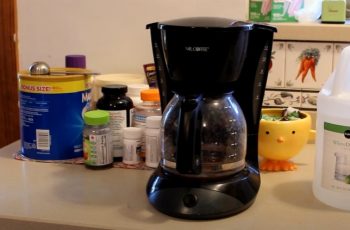Saving money along with energy is always considered cost-effective. A person should know how much he is using it and how it is essential to take care of these things, but due to many small appliances, we use to never pay attention to the amount of power it uses. We often don’t care about the electricity bills that what impact they can have on us.
Now the question that we should always think about is:
How Much Energy Does an Appliance Like Coffee Maker Use?
A person should always know what the watt is in small appliances like a coffee maker that will help us use the machine efficiently.
When you need to have coffee that can help you stay awake in the morning, the important thing is to know how much energy a coffee maker uses that may not be at the forefront of your mind.
Moreover, you may see that the coffee ritual has a significant impact, and the monthly electricity bills depend upon the way you make coffee. Often the expenses can be more than expected.
Now, you need to understand how much power or energy you are using to the wattage of the coffee maker and the way to conserve that energy without reducing the number of cups of coffee you usually drink in a day.
Surprise – The Cost Of Boiling Water
It does not matter at all how you are think to make your coffee. The bulk of the energy will for sure go into heating up the water. It has been recorded that about 1000 watts over five minutes bring that water from 50 degrees to almost 200 degrees. Obviously, if you are using water to boil on a gas stove and pour over a single serving funnel or into a French press, there will be no electricity used.
Now there are three basic types of electricity-powered coffee makers:
- automatic drip machines,
- single-serving pod devices,
- espresso machines.
Also, electricity has been used to boil the water. There are many appliances that also consist of secondary energy costs to power the warming plate, and the water remains hot even after the brewing process. There are trace amounts of electricity that go into the bells, whistles and it also consists of features like steam wands, timers, and built-in grinders.
Additional energy will also be used if the coffee maker consists of standby power that can be used to run a clock or timer.
How Much Does It Cost to Use a Coffee Maker
People prefer to use models between 750 to 1200 watts with an automatic shutdown that occurs after two hours. This indicates that, on average, each pot will run for you about 0.083 kWh, and if we talk about it annually, so an average full-sized automatic drip filter coffee maker will use about 730 kWh that costs a rate of 12¢/kWh $87.60 or $7.30 per month.
To brew 4 cups of coffee, your average coffee maker has been used for 10 minutes. It takes about almost 800 watts per hour for a coffee maker to run that is equivalent about 133.33 Wh, or 0.133 kWh. This simply explains that you are spending $5.90 every year if you brew coffee each day. The cost of electricity from the coffee maker are almost as high as the incandescent light bulbs but it is good to have only one coffee maker instead of 40.
Method to Limit Energy Consumption While Using a Coffee Maker
It is indeed tempting to discount the electricity cost that can be used into small appliances like toasters, coffee makers, electric blankets. It is still considered as a smart way to save some energy in coffee maker.
A coffee maker will use approximately one watt of power in addition to the energy used for the purpose of brewing. This is equivalent to 24 watts a day and almost 8.76 kWh annually which is not significant. Coffee makers are energy efficient and one can easily save some energy by brewing a larger amount of coffee and storing it in a vacuum flask or Thermos, instead of preparing a single cup whole day.
Final Verdict
The best way to save some energy is to unplug the coffee maker after using it every time. A coffee maker will use energy simply by being turned on or plugged in, even it is not used by anyone. The functions that will be operating includes cleaning mechanism, automatically run whole day and drain electricity.



